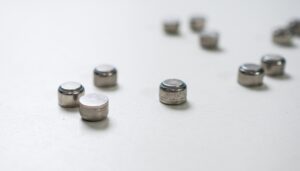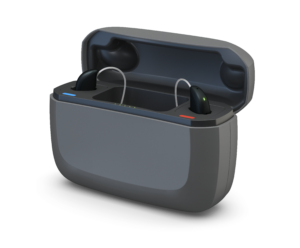When purchasing hearing aids from our office, there will be a variety of considerations to make, including the style of hearing aid that best fits your hearing loss, the type or model of hearing aid to pick form, the number of features and connectivity options you require, as well as your preference for rechargeable vs. disposable hearing aid batteries. This decision is an important one, as it will have a direct impact on how you power your instruments and the way they operate. Our audiologist will work with you to ensure you find the right power solution for your needs.
While one option isn’t necessarily superior to the other, your decision to purchase rechargeable vs. battery-operated hearing aids is often a matter of personal preference. When deciding between disposable vs. rechargeable models, please consider the following advantages and potential disadvantages:
Disposable Hearing Aid Batteries
 Zinc-air batteries are the most commonly used disposable hearing aid battery option and have been around for decades. This battery type is activated by removing the sealing tab allowing oxygen from the air to pass into the cell and start a two-step chemical process. This chemical reaction produces about 1.35–1.4 V in standard battery types.
Zinc-air batteries are the most commonly used disposable hearing aid battery option and have been around for decades. This battery type is activated by removing the sealing tab allowing oxygen from the air to pass into the cell and start a two-step chemical process. This chemical reaction produces about 1.35–1.4 V in standard battery types.
Disposable batteries are reliable and readily available. Whether you’re running errands or traveling out of town, disposable batteries can be purchased at nearly every drug or retail store, making accessibility to disposable batteries incredibly convenient. However, pending your specific needs and expectations, there may be some potential drawbacks to using disposable hearing aid batteries:
- You’ll have to buy and replace your hearing aid batteries more frequently than rechargeable options.
- The batteries are somewhat small and can be difficult to handle if you have visual or dexterity concerns.
- Disposable batteries are not an environmentally-friendly option.
Rechargeable Hearing Aids
 Lithium-ion rechargeable hearing aids have gained a lot of traction within recent years, being a convenient yet reliable power source. These batteries typically last all day long and only need to be recharged while you sleep. Rechargeable hearing aid batteries also reduce monthly expenses and are easier for those individuals with dexterity issues, who may have trouble replacing disposable batteries.
Lithium-ion rechargeable hearing aids have gained a lot of traction within recent years, being a convenient yet reliable power source. These batteries typically last all day long and only need to be recharged while you sleep. Rechargeable hearing aid batteries also reduce monthly expenses and are easier for those individuals with dexterity issues, who may have trouble replacing disposable batteries.
However, pending your specific needs and expectations, there may be some potential disadvantages to rechargeable hearing aids that are worth considering:
- They’re only available in select hearing aid styles.
- The cost for rechargeable hearing aids may be slightly higher upfront.
- You’ll typically need access to an electrical outlet to recharge your hearing aids.
What’s Best for You?
There is no “one-size-fits-all” solution when considering rechargeable hearing aids vs. disposable hearing aid battery models. That’s why Dr. Drummond and the staff at Affordable Audiology & Hearing Service are here to guide you in this process and help you select the best power option for your new hearing aid purchase.
The team at Affordable Audiology & Hearing Service will help you weigh out the pros and cons of each power source, ensuring you make the right decision for your specific needs and requirements. Please give us a call if you’d like to learn more about rechargeable vs. battery-operated hearing aids.
